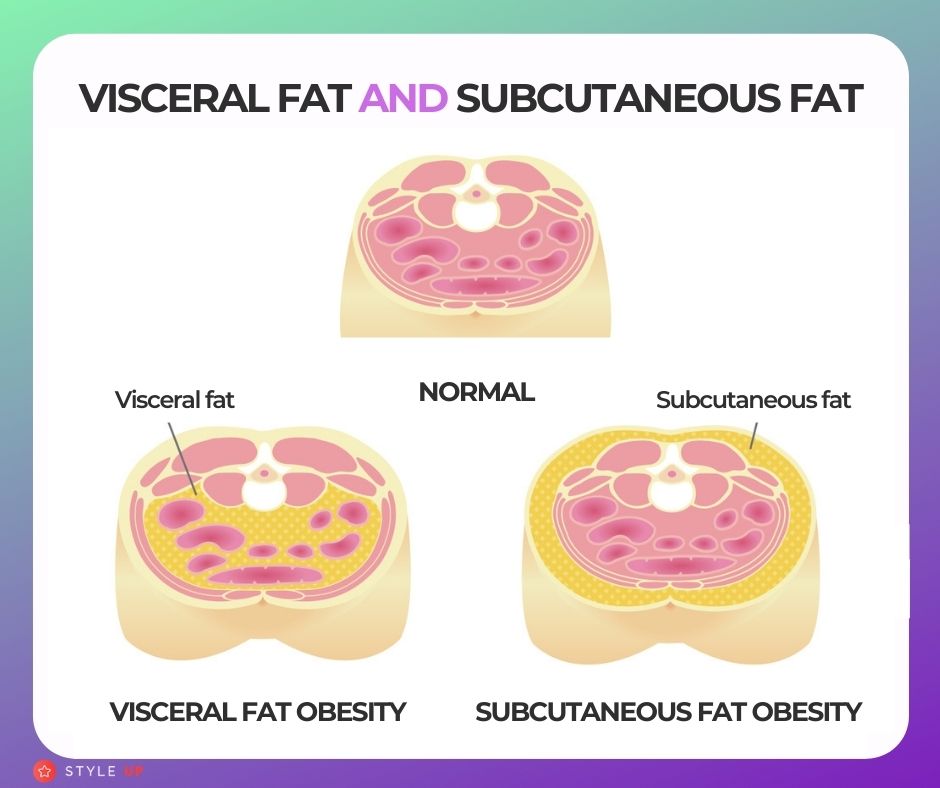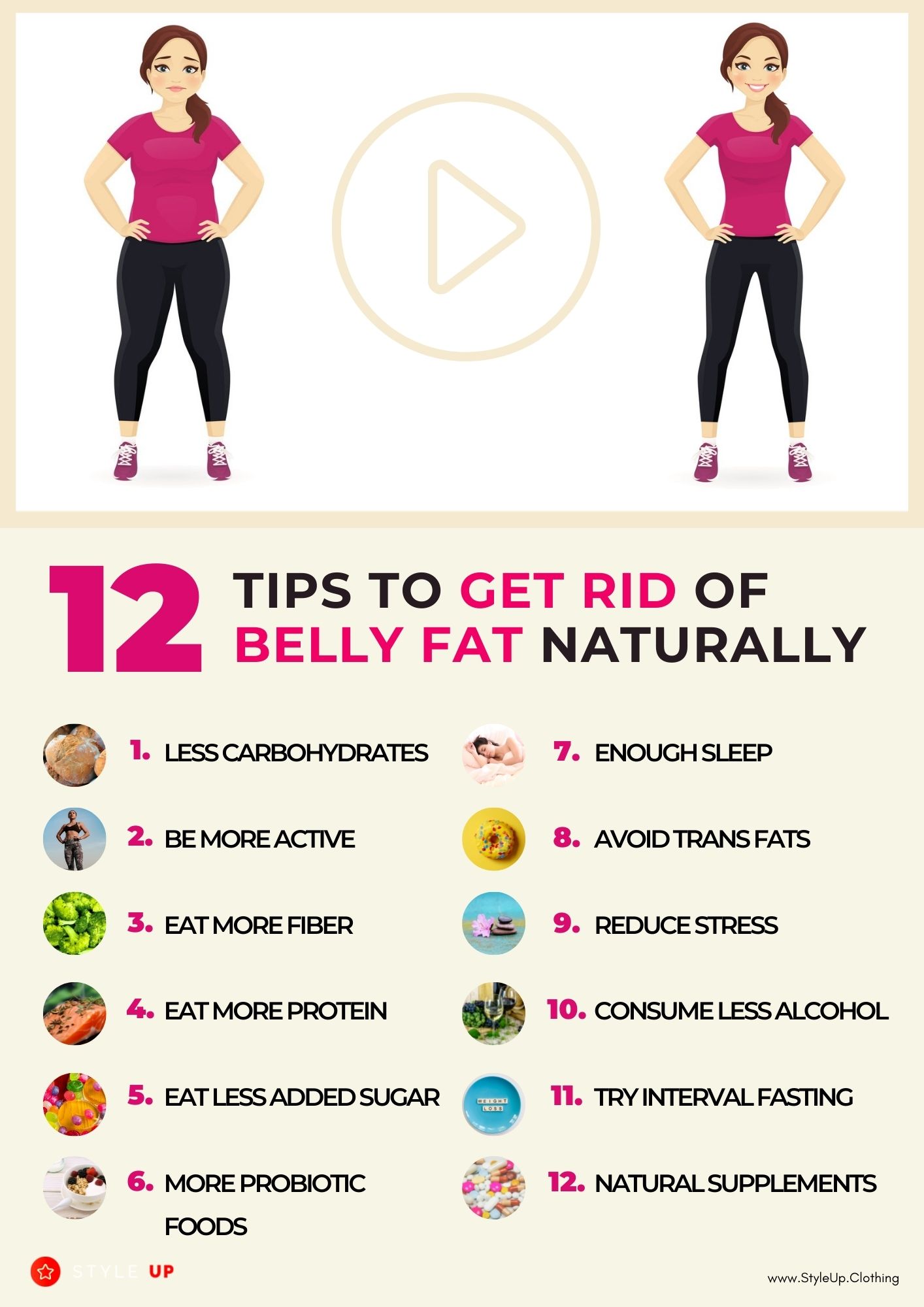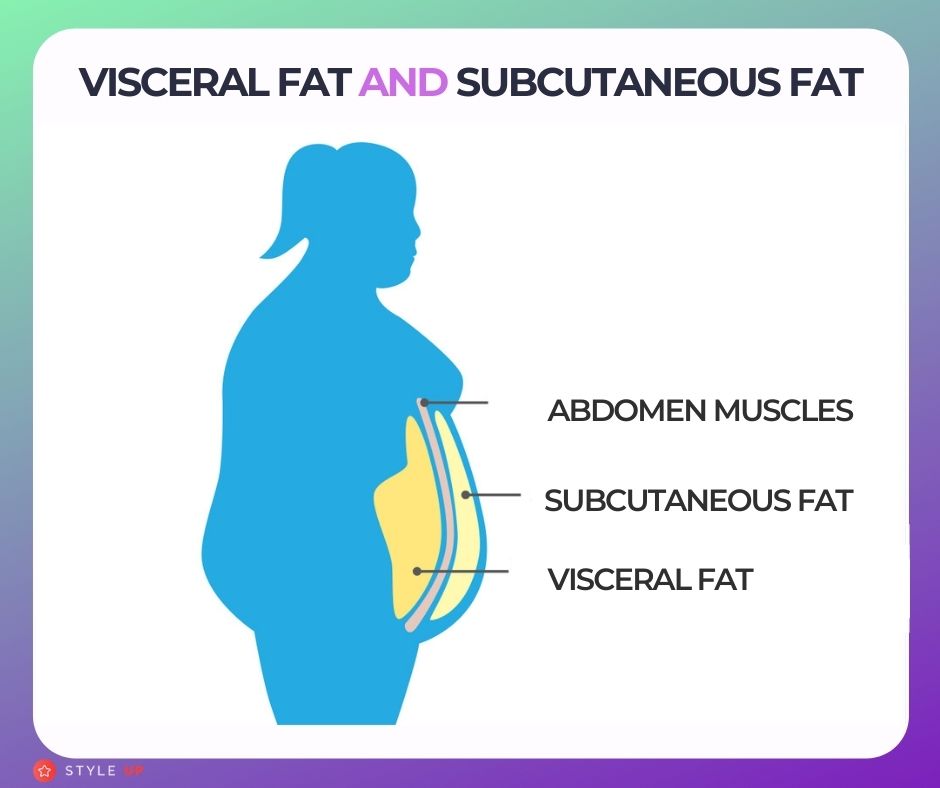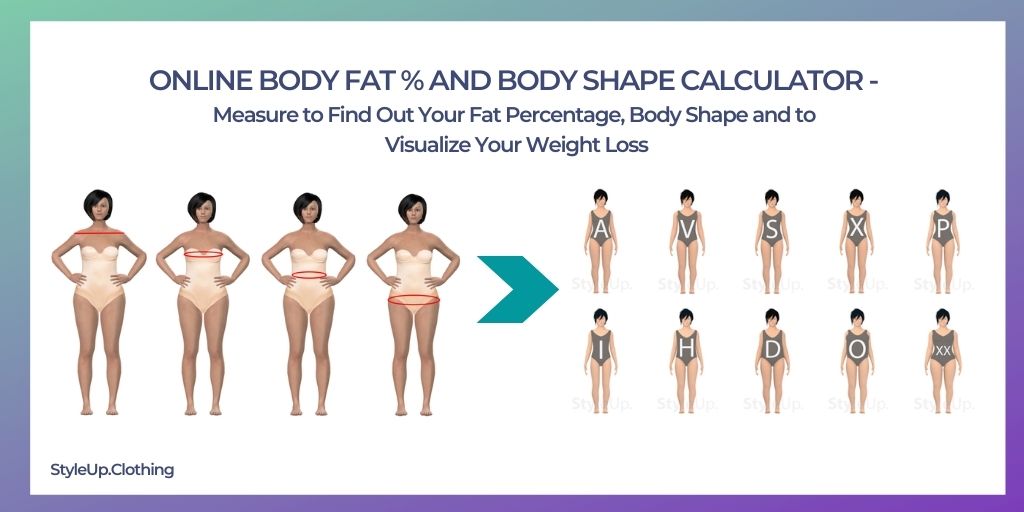BELLY FAT (VISCERAL FAT) – THE DANGERS OF BELLY FAT AND 12 WAYS TO LOSE WEIGHT AND GET RID OF BELLY FAT NATURALLY
What is belly fat (also called visceral fat) and why someone with the so-called apple-shaped body (O-Shape according to StyleUp) should be more worried than a person with a pear-shaped body (A-Shape according to StyleUp)? Because if you have an apple-shaped body, the fat is deposited in the belly, and most of it is in the abdominal cavity.
The visceral fat in the abdomen is a fatty tissue that is located in vital organs and the space between them. Having excess visceral fat is significantly more damaging to your health than having too much subcutaneous fat.
In a pear-shaped body, the fat is deposited mainly on the hips and thigh and is mostly subcutaneous fat. This type of fat is normally harmless and can even protect against some diseases.
Luckily, there are effective and natural measures to reduce your waist circumference and visceral fat with it.
Here in this article, I write not only about how to naturally get rid of belly fat, and why this type of fat is more harmful to health than other types of fat, but also about the biological reasons behind obesity and why your body deposits fat. Most importantly, why is it so hard to keep this excess fat away in the long term and why does it sometimes come back in double?
So here you will find 12 simple tricks that can help you have a healthy visceral fat level and waist size. And these tips will work in the long run. Meaning, if you will pursue this type of lifestyle, your belly fat will also stay away. Also, why should you be afraid of visceral fat in the first place?
I sincerely hope that after finding out these reasons why your body works this way, it will be easier for you to have friendly relationships with your body again, and get rid of this excess fat. So, here we go.
 The risks of overweight and obesity - why is belly fat (visceral fat) dangerous?
The risks of overweight and obesity - why is belly fat (visceral fat) dangerous?
- Visceral fat releases toxins that enter your bloodstream and can cause inflammation. Inflammation promotes vascular and coronary artery calcification, resulting in a higher risk of a heart attack (1, 2).
- It has been found that too much visceral fat can cause insulin resistance, leading to type II diabetes and glucose intolerance (3, 4).
- Excess visceral fat is thought to also be a risk factor for developing certain cancers (5, 6).
Even 8 - 11 pounds (4-5 kilograms) of excess body weight can reduce immunity and contribute to increased blood cholesterol levels, the risk of diabetes, high blood pressure, coronary heart disease, and gallstones (12).
Difference between overweight and obesity
If a person's body mass index (BMI) is between 25 and 29, they are considered overweight. However, if the figure is greater than 30, the person is obese. Obesity is not just the deposition of excess fat and the formation of cellulite, but primarily a disorder of the endocrine and circulatory systems and metabolism. Obesity can therefore be considered a disease. You can calculate your body mass in the StyleUp body mass calculator on the virtual me page.
The body regulates and always maintains its own weight, which is necessary for the normal functioning of the organs and organ systems, as well as for ensuring reserves of necessary substances and building up reserves (12).
Causes of overweight and obesity - why does your body deposit excess fat?
Your body is constantly trying to maintain a balance between the calories it receives and the calories it uses. In a healthy person, body weight should be stable throughout life and equal to, for example, what it was at the age of 18-19. If a person consumes little water, starts restricting food, and does not stick to normal eating habits, the body starts to increase its stores and gain weight.
In young women, the body often starts to build up extra reserves for pregnancy and childbirth, and in colder climates, also for the autumn-winter period to better protect itself against the fall in outside temperatures.
Obesity can develop as a result of a variety of factors over a long period of time. These factors include:
- Inappropriate and excessive eating. This is the cause of obesity in 75% of cases. Not to mention these decadent late dinners, which are the worst from your body's point of view.
- Unhealthy and irregular diets. Your body triggers an obesity program to protect itself against possible weight loss. This is why people who eat in a hurry, or on the run, and consume sugary foods (pies, pastries) and easily available fast foods (hamburgers, sandwiches, sodas), will suffer severely from irreversible obesity, triggered by a subconscious program. From your body's point of view, such a diet is "random" and "unstable". As a result of such a diet, a large amount of glucose is rapidly converted into fat. After only half an hour, the blood glucose level drops, you feel weak, your performance reduces, then your appetite rises sharply and you feel the need to eat again. So, you'll do it. If the glucose accumulated in the body is not used up by exercise, the body starts to gain fat.
- Lack of water in your body. This makes the biochemical processes of fat breakdown more difficult.
- Lack of vitamins and nutrients in your body. Well, your brain, together with your body, are smarter than you may think. They both need certain vitamins, minerals, and other nutrients for their functions. But, if you give them “dead food”, meaning food without necessary nutrients in it - they give you back a hunger signal. Why? Because they are still hungry, as they did not get vital nutrients from the food you just ate. So, if you eat over-processed and so-called “empty” food, your brain - together with the rest of the body, will continuously be in hunger, and will not stop to give you hunger signals. So you eat and eat.
- The presence of parasites in the intestine, intestinal contamination, and disturbances of the intestinal microflora. I will soon write more about this topic and add a link to my new article here for those who want to know more.
- Lack of physical activity, lack of daily exercise, and loss of muscle mass. What else is new right? But this belongs on this list 100% because muscle mass burns more calories in itself.
- Lack of sleep. Have you noticed that when you have not slept well, you are hungrier than usual?
- Disorders of the organs related to your gender, adrenal glands, thyroid gland, and pituitary gland.
- Use of hormonal contraceptives (these contain estrogens which promote fat deposition).
- Excessive use of coffee. Using too much coffee, triggers the pancreas to secrete elevated levels of insulin and, together with this, promotes fat formation.
- Strict dieting during pregnancy. The better the mother eats during pregnancy, the less likely the child will suffer from obesity as an adult.
- Not feeling loved. Obesity in children can also be caused by a feeling that they lack parental love and care. That was also one thing that needed to be said - emotions do matter in everything linked to our health, as well as in gaining weight. You may even say - you are eating your negative emotions, such as your fear, your stress, your pressure, and the feeling you are not good enough. So, if there are too many negative emotions - you eat too much. It's just to compensate for the lack of other positive stuff in your life at the moment. But the more you gain knowledge, learn about the reasons behind your feelings, and understand the connection between your body, as well as learn how to set your mind - the less this bad stuff happening in your life - affects you. May I also say - bad stuff is never truly bad stuff. It's a sign that you should dig deeper…
- Excessive artificially induced weight loss. There is a genetic obesity program in your body that can be triggered by excessive weight loss. This means that, for example, if a person becomes excessively thin (below the normal BMI) through dieting or consuming suspicious dieting products, this will later trigger obesity (12).
 12 Tips to lose weight and get rid of belly fat naturally
12 Tips to lose weight and get rid of belly fat naturally
The first step is to understand that losing weight is not easy. It's going to require your full dedication, and you have to work hard - really hard. I'm not saying it in a bossy way, although it may sound like this (and please forgive me if it does), but it has to be your priority project because it's the only way this is going to work.
You must take care of your body, listen to it, start loving it, and also help it - only you have the power to provide your body with what it needs to maintain a normal body mass, create the conditions for normal sleep, effective recovery, etc.
It is also important to understand the importance of the first steps to be taken to reduce body weight. This means making an agreement with your body. Because if you start to lose weight without first helping your body, just by restricting eating, your body will find a way to store fat or to regain weight quickly, preparing itself for the next violence against itself. Therefore, it's also important to understand that you must not restrict eating - because this is a serious violation of the agreement you just made with your body, and your body starts to work against you.
Also note that for stable weight loss, your body needs time. To avoid wrinkles, saggy skin, or other possible health issues, it's not recommended to lose weight of more than 22 pounds (10 kilograms) in one month (12).
1. Eat fewer carbohydrates
Foods low in carbohydrates help to prevent and reduce fat levels, including visceral fat. For example, studies have shown that ketogenic diets effectively lower the visceral fat percentage of the body’s total weight.
2. Get active to get rid of visceral fat
When you exercise enough - your body starts burning fat. So mixing a healthy diet with aerobic exercise effectively reduces visceral fat. The more intense aerobic activity the more effective. Sprinting and swimming are good examples.
3. Eat more fiber
Consuming more fiber has many health benefits. It helps to digest food and also your stomach stays full for longer. Moreover, eating more fiber-rich foods may help to control food cravings, as well as to reduce the chance of gaining weight. If your diet does not contain enough fiber, adding fiber-rich foods to your daily menu would be a good idea. Sure, there is also an option to take dietary fiber supplements.
4. Eat more protein
Consuming more protein can help to reduce levels of visceral fat. Protein-rich foods keep the feeling of fullness longer, so you eat fewer excess calories. Several studies have found that those who eat protein-rich food regularly (more than the recommended daily allowance) have a lower body mass index and waist size (visceral fat marker) than the average (7).
5. Eat less sugary foods
Eating a lot of added sugars causes more visceral fat to build up in your body. Added sugars are everywhere in processed foods, so it's best to choose more natural, and unprocessed foods.
6. Probiotic foods for healthy fat levels and to normalize the microflora in your GI tract
Your microbiome is a very important part of your health. Several studies have shown that consuming certain strains of probiotics (such as Lactobacillus and Bifidobacteria), may help to reduce body weight (8).
You`ll get probiotics from foods such as kefir, kimchi, and sauerkraut, but also by consuming probiotic supplements. Read more about the 40 health benefits of probiotics and 20 top probiotic-rich foods here.
7. Enough sleeping hours
Sleeping too little can cause the body to be out of balance in many ways, because your body considers the lack of sleep, as a lack of food. So, if you are not sleeping enough, you'll eat more. What's worse, studies have found that the lack of sleep combined with free access to food not only leads to gaining weight but increases the accumulation of unhealthy visceral fat inside your belly. Therefore, it's best to sleep regularly for about 7-8h (9).
8. Avoid trans fats
Check labels and avoid foods with trans fats. Trans fats are known to raise visceral fat levels and also cause other health problems. Therefore, instead of picking processed foods - select healthy whole foods. Trans fats are included in the content of various snacks, margarine (not butter, but margarine), deep-fried foods, ready-made foods, and pastries.
9. Reduce stress
Long-term stress is devastating to your health. Studies have shown that chronic stress keeps cortisol levels (stress hormone) at a constant level, which badly affects your overall health and also waist circumference.
Reduce stress by reducing workload when needed, resting adequately, and engaging in soothing activities. For example meditation, yoga, being in nature, and spending time with your family may all lower your stress.
You can also try natural stress-relieving supplements, such as the Ashwagandha Root Extract, which is said to even prolong life. Read more about the 14 health benefits of Ashwagandha here.
10. Consume less alcohol and coffee, but more water
Those who regularly drink alcohol in higher amounts also have a wider waist size and visceral fat levels. Alcohol also contains more calories than other carbohydrates – 7kcal/1g compared to 4kcal/1g (carbohydrates). And that's not all. To support your weight loss, it is extremely important to be hydrated. However, alcohol, as well as coffee remove water from your body.
The water level in your cells normalizes for about 2-4 days, and only after a normal water level, your body can start burning fat. It's even said, that if you have enough water in your body, the fat will melt by itself (about 2,2 pounds (1 kilogram) per month) (12).
11. Getting rid of parasites, cleansing your body, interval fasting, and avoiding muscle tension
- Getting rid of parasites and cleansing your body. I will write more about getting rid of parasites soon because parasites can play a huge role in gaining weight and cleansing your body is vital in supporting weight loss. Until I write about parasites, you can read about how to cleanse your body of other toxins here.
- Interval fasting. Some believe that also interval fasting can help cleanse your body and lose weight, as well as reduce visceral fat (10, 11).
- Avoiding muscular tension. It might also help if you get rid of muscular tensions in the vertebral region which may compress the channels of the nerves that regulate metabolism (12).
12. To support weight loss, it's important to eliminate nutrient deficiencies in your body, so here are dietary supplements to support your weight loss
- Probiotics – If you think your daily menu does not contain enough healthy foods and you often get sick, you can try probiotics for one week. These good bacteria can help to restore your gut microbiota and avoid dysbiosis. Read more about the 40 health benefits of probiotics and 20 top probiotic-rich foods here.
- Fiber – To get rid of visceral fat, consuming enough healthy fiber is important. However, if your diet does not contain enough fiber-rich foods - you can try fiber supplements. For example, the fiber-rich intestinal cleansing detox contains fiber, which helps to cleanse the intestines by linking them with harmful compounds and residues. Ecosh Body Cleansing Detox with seven body cleansing plants helps to cleanse your body from toxins, nourish the body with valuable nutrients, prevent health problems, and support the work of the immune and other essential organ systems.
- Vitamin C, vitamin B6, and zinc - Together, these may help to support decomposing fat in your cells (12).
- Calcium - This mineral may speed up the processing of subcutaneous adipose tissue and at the same time prevent the deposition of new fat layers (12).
It is thought that eliminating nutrient deficiency in your body, helps your body to activate its self-healing processes (12).
 Summary
Summary
All people have visceral fat, but if your waist size is already suffering, then there is probably too much of it. Keep an eye on your belly, measure, weigh, and take the 12 previously mentioned steps to reduce the problem if necessary.
Too high a level of visceral fat is bad for your health and it is particularly associated with an increased risk of diabetes mellitus, cardiovascular diseases, and certain cancers.
Fortunately, there is much in our own hands. By having a healthy lifestyle and applying all of these steps to a greater or lesser extent, you can maintain the waist circumference and visceral fat proportion within the normal range.
StyleUp.Clothing – Body fat percentage and body shape calculator. Visualize your weight loss and find out your body shape. Available only on PC.
NB! The information provided here is for informational purposes only and should not be construed as health care or medical diagnosis and treatment. This information should not be construed as a guarantee of achieving results. In addition, this information is not intended to replace the advice of your physician or another healthcare professional.
Do not use this information to diagnose or treat a health problem. Before changing or discontinuing your existing medication, treatment, or care, or taking any dietary supplements, be sure to consult with your healthcare professional or doctor before starting any diet or program, or if you suspect you may have a medical condition.
Written by Maria-Helena Loik
The shorter version of this article was also posted on Ecosh.com
Pictures: StyleUp.Clothing, Pexels.com, Pixabay.com, Shutterstock.com
Sources:
- Coronary Artery Calcification and Risk of Cardiovascular Disease and Death Among Patients With Chronic Kidney Disease - PMC (nih.gov)
- Role of Inflammation in Arterial Calcification - PMC (nih.gov)
- Visceral Fat (Active Fat) - Types of Fat, Insulin Resistance & Health Risks (diabetes.co.uk)
- Obesity, Insulin Resistance, and Type 2 Diabetes: Associations and Therapeutic Implications - PMC (nih.gov)
- Visceral Obesity and Its Shared Role in Cancer and Cardiovascular Disease: A Scoping Review of the Pathophysiology and Pharmacological Treatments - PMC (nih.gov)
- Visceral Adiposity and Cancer: Role in Pathogenesis and Prognosis - PMC (nih.gov)
- Clinical Evidence and Mechanisms of High-Protein Diet-Induced Weight Loss - PMC (nih.gov)
- Effects of Probiotics and Synbiotics on Weight Loss in Subjects with Overweight or Obesity: A Systematic Review - PMC (nih.gov)
- Lack of sleep increases unhealthy abdominal fat, study finds -- ScienceDaily
- How Intermittent Fasting Can Help You Lose Weight (healthline.com)
- Intermittent fasting vs daily calorie restriction for type 2 diabetes prevention: a review of human findings - ScienceDirect
- Step-by-step self-healing guide: Mihkelsoo Ljudmilla, Mihkelsoo Virgo: 9789949725403: Amazon.com: Books

